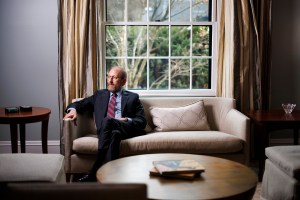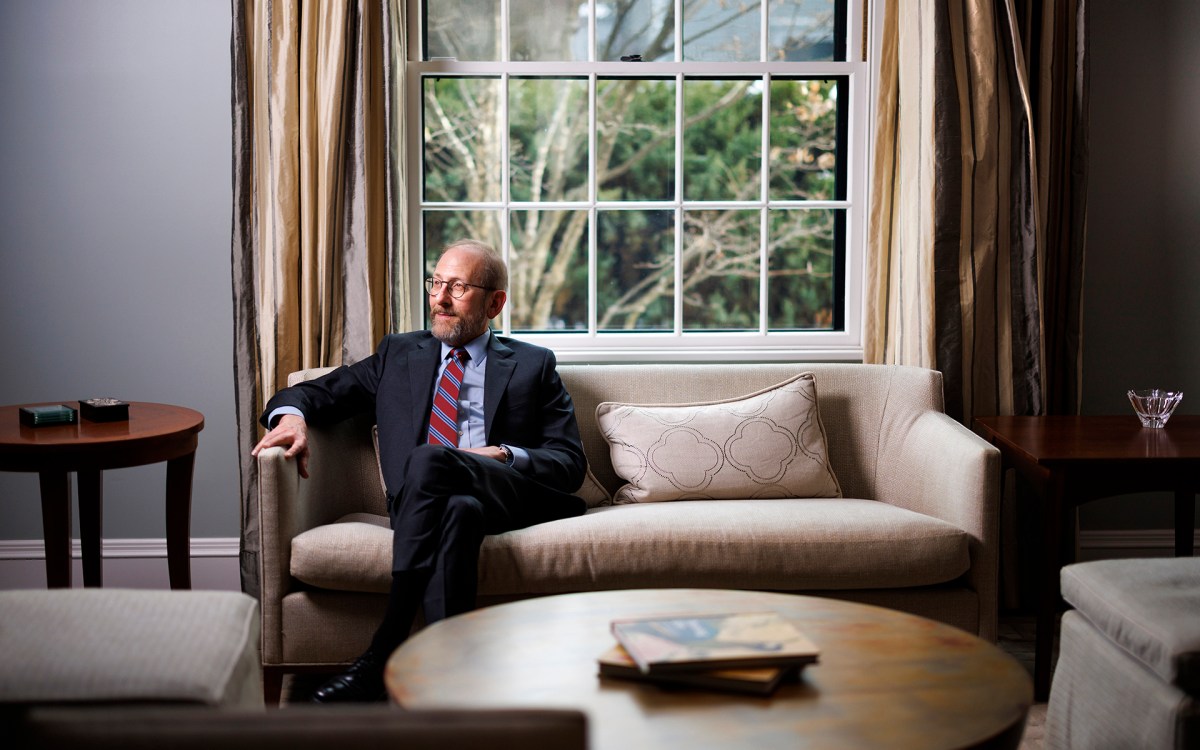Fairbank Center welcomes fellows and visiting scholars
Professor of Chinese Literature Wilt Idema, director of the Fairbank Center for East Asian Research, has announced the center’s fellows and visiting scholars who are spending the 2003-04 academic year at Harvard. “Each of these scholars specializes in some aspect of China,” Idema said, “and each is contributing new insights to their field of inquiry. During the course of the year these scholars are presenting talks and seminars that we advertise and open to the Harvard community. All of the fellows will moreover be conducting workshops in the spring of 2004 that will likewise be open to the public to attend.”
This year, the center selected six An Wang Postdoctoral Fellows from over 80 applicants. The fellows and their research projects are as follows:
Robert Culp, who received his Ph.D. at Cornell University, is revising his thesis “Articulating Citizenship: Community, Civility, and Student Politics in Southeastern China, 1912-1937.”
Eileen Otis, a Ph.D. in sociology from the University of California, Davis, is investigating “The Gender of Dignity: Labor Regimes of Femininity in China’s Market Reform Economy.”
Anne Reinhardt, who studied history at Princeton University, is writing on “Navigating Imperialism in China: Steamship, Semi-colony, and Nation, 1860-1937.”
Carlos Rojas, a Ph.D. in literature from Columbia University who now teaches in Florida, is preparing a manuscript on “The Chinese Body Politic: Science, Politics, Subjectivity, and Corporeality in Modern China.”
Shao Dan, who received her Ph.D. in history from the University of California, Santa Barbara, is revising her thesis “Ethnicity in Empire and Nation: Manchus, Manchoukuo, and Manchuria, 1911-1952.”
Hsiu-Hua Shen, the first Taiwan Studies postdoctoral fellow, received her Ph.D. from the University of Kansas and is working on the topic “Crossing the Taiwan Strait: The Politics of Identity Construction and the Global Economy.”
In addition, two Fairbank Center Fellows are in residence this year at the University. The fellows and their research projects are as follows:
Cathryn Clayton, who received her Ph.D. in anthropology from the University of California, Santa Cruz, is writing on “If We Are Not Different We Will Cease To Exist: Culture and Identity in Transition-Era Macau.”
Shelley Drake Hawks, who received her Ph.D. in history from Brown University, is working on her project “Minding a Spiritual Garden: Dissent and Resistance during the Cultural Revolution.”
The center also welcomes 14 Visiting Scholars this year. These established scholars will be based at the Fairbank Center for the current academic year while they consult with Harvard faculty and conduct seminars in their field of research. “These are an especially vibrant and diverse group of researchers,” Idema said.
Michael Chambers, who teaches at Indiana University, is writing a book about how China acts as an ally and its foreign policy toward the Asia-Pacific countries.
Yih-Chyi Chuang, from the National Chengchi University in Taiwan, is exploring human capital, trade, technology assimilation, and Asian economic growth under globalization.
Shufan Ding, who is also from the National Chengchi University, is working on the topic of threat and deterrence, and how China conceives of deterrence.
Fang Jue, a political activist and commentator from the People’s Republic of China (PRC), is examining Chinese foreign policy and domestic politics.
Kawajiri Fumihiko, a professor at Tezukayama Gakuin University in Japan, is exploring the intellectual history of modern China, in particular the development of enlightenment thought in the late Qing period.
Liu Jianfei, from the Institute of Strategic Studies in the PRC will examine the triad relationship among the United States, the Chinese mainland, and Taiwan in the post-Cold War era.
Nie Qiaoping will be arriving at the Fairbank Center early in 2004 to continue study on classical Chinese poetry and poetics, and hermeneutic issues about the poet Du Fu in classical Chinese literature.
Qin Hui, from Tsinghua University in Beijing, is researching peasant history and ongoing rural reform in China.
Craig Smith, who is visiting China until mid-December, is working on the economic and social implications of digital technology networks as they spread into Asia’s hinterland areas. He will emphasize the role of greater China in this process.
Wang Yan will be returning to China at the end of 2003 after having spent over a year at the Fairbank Center doing research on an oral history of the Cultural Revolution. He will return to his teaching post at Sichuan University.
Xiao Chi, from the National University of Singapore, is working on traditional Chinese poetics in relation to intellectual history with special reference to Buddhism and Confucianism.
Yang Wenjiang, from the Institute of Contemporary International Relations in the PRC, is investigating U.S. foreign policy as it relates to China and Taiwan.
Yu Xiaofeng, a professor at Zhejiang University, will also be returning to his university after having been at the Fairbank Center for the past year. Focusing on ethics in international relations, his recent Chinese-language book “Guoji guanxi lonlixue” (“The Ethics of International Relations”) was published in China while he was at the Fairbank Center.
Zhou Qin, from the University of Guam has been investigating the Chinese cosmic order and moral autonomy.




